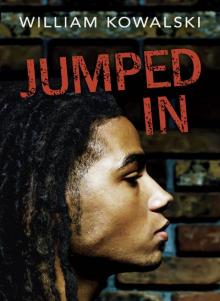- Home
- William Kowalski
Just Gone Page 2
Just Gone Read online
Page 2
“Sergeant, you let me handle that part of things,” I said. “Far as you know, this was just an anonymous phone call. I imagine it wouldn’t have been too long before someone noticed anyway. She must not have been in very good shape by the time you got there.”
“It was pretty rough,” he said. “Imagine a body lying dead for days in this heat. The evidence all points to an accident, so that’s how I’ll write it up. But Mother, you gotta promise me this is the right thing. If there were children involved, they have to be looked after.”
“They will be, Sergeant, I promise,” I said. “You know you and me are on the same team. Besides, think of all the paperwork I’m saving you.”
Sergeant Kosinski grumbled something and hung up. He was a gruff fellow, but he had a big heart, and we trusted each other. And we had one other thing in common—we both hated paperwork.
I called Chantay and Jamal over to me.
“Children, they found your mother,” I said.
“What’s gonna happen to us?” Chantay asked.
“For now, you’re gonna stay right here with me.”
At that they looked happy.
“And your mother is going to be taken care of nice and proper,” I said. “She’s all right now. She’s with God.”
“She ain’t with God,” said Jamal. “Jacky Wacky got her.”
“Now you listen,” I said. “I won’t have no blasphemy.”
“What’s that?” Jamal asked.
“It means talking against God,” I told him.
He shrugged.
“I never seen God, but I seen Jacky Wacky plenty of times,” he said. “When grownups be bad to kids, Jacky Wacky gonna take care of them.”
I was starting to understand something then. I knew Jamal didn’t get those marks on his body from normal accidents. It looked to me like he’d been hit, and maybe worse. Besides his rat bites, there were one or two marks that looked like cigarette burns. And he had welts on his back that I knew were from being beaten.
“Jacky Wacky punishes the bad grownups?” I asked. “Is that how it works?”
“That’s why he got our mama,” Jamal said.
“I told you he crazy,” Chantay said to me.
“Was your mama ever bad to you?” I asked them.
Chantay started pacing back and forth. She looked like she might cry. That was my answer right there. But Jamal was as cool as a cucumber.
“They gonna bury our mama?” he asked me.
“Yes,” I said. “She’ll be taken care of.”
“They gonna do it in church?”
“There will be some kind of funeral,” I said.
“Well,” said Jamal, “I ain’t goin’. I’m stayin’ right here.”
That was all I needed to know about their mama. The Lord works in mysterious ways. Maybe these kids were better off with me after all, and that was why he brought them to me. It is not up to me to question things. I know that now. I can’t choose the times I live in. I can only decide how I’m going to live.
CHAPTER FOUR
For the next few days, I kept Chantay and Jamal close. It wasn’t hard. Chantay liked helping me around the shelter. There was always plenty to do. And Jamal entertained the other children with his stories of Jacky Wacky. I listened too, though I pretended not to.
Jacky Wacky, I learned, was once a homeless child himself. The angels saw how good he was and decided they needed his help. They gave him magical powers. Now, as a grownup, he wore raggedy clothes to show that his heart was with the poor people. He wore a floppy hat that covered his face, so you could never see what he looked like. And he carried two suitcases with him. They were all beat up, like he had been around the world a thousand times and carried those suitcases every step of the way. One of the suitcases was white. It was full of food, which he gave out to hungry children. The other suitcase was black. This one contained the punishment for adults who were bad to children. The punishment was usually death.
Shelter children have always told wild stories. It’s how they explain their world to themselves. They need a way to understand violence, drugs, abuse and, most of all, death. So they make up stories and tell them to each other. Sometimes the stories take on a life of their own. They get repeated, and they grow. But I’d never heard a story quite like Jacky Wacky before. Then again, I had never met a little boy quite like Jamal before either.
I let him tell his stories. I saw no harm in it. A good imagination is a sign of intelligence in a child. And Jamal was as bright as could be. I knew I was going to miss him, but I couldn’t keep them around much longer. I was going to have to find them a real home.
There was a lady named Mrs. Mingus who lived in a townhouse near the shelter. She was what you might call a church lady. She didn’t have any children of her own. She was married once, but her husband died a long time ago. I used to see her every Sunday, waiting in line to talk to the minister after his sermon. Sometimes she came down to the shelter and volunteered. She used to tell me, “Mother Angelique, you ever need anything, just ask.”
Well, I needed her now. I don’t like asking things for myself. But when it comes to asking for the children, I don’t hesitate. And I will keep after you until you say yes.
The three of us showed up at her place one fine morning. Mrs. Mingus came to the door in one of her crisp dresses. That woman was always spotless. I suppose that should have been my first warning.
Usually I don’t trust people who look too clean. But I was anxious to find these kids a home. I needed to be able to tell Sergeant Kosinski that they were taken care of.
“These are them?” she said, looking the kids over.
“Chantay and Jamal, this is Mrs. Mingus,” I said. “Anyone asks, she’s your great-aunt. You’re going to stay with her from now on. You’ll be safe here.”
“How come we can’t stay with you?” Jamal asked me.
“Because I can’t keep you,” I told him. “The shelter is supposed to be a temporary place.”
“What’s that mean?”
“It means you can only stay there a little while.”
“You getting rid of us,” he said.
“No, I am not,” I said. “I will come visit you. And you can come see me anytime. But this is a real home, children. You’ll be looked after here.”
“How come we gotta stay here?” Chantay asked. I could tell right away the kids didn’t like Mrs. Mingus. Sometimes kids just know things.
“If you want to stay together, this is where you have to be,” I told her. “Otherwise you’ll get sent to live with strangers. And who knows what will happen then? So let’s not have any complaining.”
“Mother Angelique, these children will be just fine with me,” said Mrs. Mingus. “I am looking forward to getting to know them.”
I had already told Mrs. Mingus the whole story. She knew Chantay and Jamal were scared and grieving, that it might take a while for them to adjust. Mrs. Mingus had said that was fine with her. She seemed like an understanding woman.
I helped them settle in. That townhouse was like a museum. Everything was spick and span. It looked like nothing ever got touched or used, only looked at. Mrs. Mingus showed them their bedrooms.
“I get this whole room for myself ?” Chantay said.
“Indeed you do,” said Mrs. Mingus.
“I get my own too?” said Jamal.
“Aren’t you lucky?” I said.
“I never had my own room before,” said Chantay. “Me and Jamal had to share with my mama. And whatever man she brought home.”
Mrs. Mingus looked at me and shook her head. She and I were having the same thought—what things had these children seen?
“You will have to promise to keep your rooms clean,” said Mrs. Mingus. “You’ll do chores every day. What children need most of all is structure,” she said to me. As if I didn’t know.
“What’s chores?” Jamal asked.
“Chores are jobs around the house,” said Mrs. Mingus. “Like cleani
ng up after yourself. Making your bed. Taking out the trash. Things like that.”
I could tell Chantay liked the idea of having responsibility. She was warming up to Mrs. Mingus. But Jamal didn’t look so sure.
“We get jobs?” he asked. “We gonna get paid?”
“You’ll get paid in room and board,” I told him. “You’re lucky to be here. Helping out is your way of paying it back.”
“And we’ll be going to church every Sunday, rain or shine,” said Mrs. Mingus.
“Ain’t no rats here, is there?” Jamal asked.
“Certainly not!” said Mrs. Mingus. She looked shocked at the very idea. “There has never been a rat in my house. And there never will be.”
“That’s good,” said Jamal. “I hate rats.”
“Do we get to go back to school?” Chantay asked.
“First thing next Monday,” said Mrs. Mingus. “We’ll get you registered here at our local school. That way you won’t have to walk so far.”
Chantay smiled. I could see she was starting to like Mrs. Mingus more and more. She was trying to be as good as she could. But Jamal frowned.
“I can’t read,” he said. “I never been to school. What if they think I’m stupid?”
Chantay rolled her eyes.
“Well, then, we shall just have to work extra hard until you’re caught up,” Mrs. Mingus said.
I hugged the children goodbye. Mrs. Mingus walked me to the door. We shook hands.
“They might need a little time to adjust,” I told her again. “They never had much of a home before.”
“Don’t worry about us,” Mrs. Mingus said. “We’ll be just fine. Once they settle in they won’t remember any other way.”
“Jamal has quite an imagination,” I said. “He can be a little silly sometimes.”
“I know just how to deal with little boys,” Mrs. Mingus told me. “Hard work and discipline is what they need most of all. The Lord will look after the rest.”
I got another bad feeling then, like maybe this wasn’t quite the right thing. But I was so happy to have found them a home that I ignored my instincts. After all, wasn’t this just what I had prayed for? Now Chantay and Jamal would have clean beds to sleep in, food on the table and a chance to start over. I could tell Sergeant Kosinski that they were safe. And I could cross them off the list of people I needed to worry about.
“Bless you,” I said to Mrs. Mingus. “God is surely smiling today.”
“We are doing his work, Mother Angelique,” Mrs. Mingus said. “See you at church next Sunday.”
CHAPTER FIVE
As it turned out, I would see Chantay and Jamal again a lot sooner than Sunday. Just two days later, I got a phone call at home from Mrs. Mingus. She sounded pretty put out.
“Hello, Mother Angelique,” she said, in a tone so sickly sweet that I knew it must be disguising some kind of poison. “We’ve got us a problem here,” she said. “A few problems, actually.”
“Why, Mrs. Mingus, whatever is the matter?” I said, as nicely as I could.
“If I had known just how sinful these children are, I might not have agreed to this,” said Mrs. Mingus. “Mother Angelique, we need to have us a talk. In person.”
“I’ll be right over,” I said.
I headed straight over to Mrs. Mingus’s townhouse and knocked on the door. When she brought me inside, I saw Chantay sitting on the couch. I could see from her red and swollen eyes that she’d been crying.
“This girl has not been honest with us,” said Mrs. Mingus. “She was hiding something.”
“Chantay?” I said. “Is there something wrong?”
She wouldn’t answer me. She just looked at her shoes.
Mrs. Mingus held up a test stick, the kind that you have to pee on. It showed two lines. I knew what that meant, even though I had never taken a test like that myself. In my case, there was no need. But I had seen them done plenty of times before.
The test meant Chantay was pregnant.
“Oh, you poor baby,” I said. I sat down next to her. She leaned into me and started to cry again.
“She’s no baby,” said Mrs. Mingus. “Not anymore.”
“I didn’t know,” Chantay sobbed.
I put my arm around her.
“All right, now,” I said. “Everything will be all right.”
“Girls like her are what’s wrong with this city,” said Mrs. Mingus. “Another mouth to feed, and no one to support it. Babies having babies.”
“Well, now, we don’t know the whole story, Mrs. Mingus,” I said. “It might have been something she didn’t want to happen. Do we know who the father is?”
“She won’t say,” Mrs. Mingus told me. “And the other one is just as bad as her, in his own way.”
“Jamal? What did he do?”
“He said someone named Jacky Wacky was going to kill me,” Mrs. Mingus said. “He’s been making threats. Blaspheming against God.”
“Where is Jamal?” I said.
“Upstairs in his room,” said Mrs. Mingus. “I locked him in there until he can behave himself.”
I stood up.
“Mrs. Mingus, this will not do,” I said. “This will not do at all. You let him out right this minute.”
She and I stared at each other. You don’t want to get into a staring contest with me. If there were an Olympics for staring a hole through someone, I’d have all the gold medals.
“Fine,” she said, taking a key from her apron pocket. “Come on with me.”
I followed her upstairs to Jamal’s bedroom. She knocked on the door.
“Boy!” she said. “We’re coming in.” She unlocked the door and tried to open it, but it would not budge, no matter how hard she pushed.
“He’s blocked it with something,” she said. “Jamal! Open up, hear?”
“Here, let me try,” I said. I grabbed the knob and twisted it. The door opened as easy as pie.
“That’s strange,” said Mrs. Mingus.
I stepped inside and looked around. There was nothing in the room but a single bed. Jamal was nowhere to be seen. I looked under the bed. I opened the closet door. He was just gone.
“Mrs. Mingus, what have you done with Jamal?” I asked.
For once, Mrs. Mingus was at a loss for words. She put one hand to her throat.
“I…I don’t know,” she said. “He was here. I know he was.”
I went to the window and tried to open it. I thought maybe he had got out that way. It wouldn’t budge.
“That window hasn’t been opened in twenty years,” Mrs. Mingus said. “No way he got out through there.”
“Could he have climbed down somehow?” I asked, looking out at the street.
“There’s not even a fire escape,” said Mrs. Mingus. “This is all the proof I need. First the door, now this. He has the devil in him. You can see it in his eyes.”
“Nonsense,” I said. “He’s a perfectly normal boy.”
“Well, then,” said Mrs. Mingus, “where is he?”
We looked all around that house. Jamal was not in it.
I used Mrs. Mingus’s phone to call the shelter, just in case he had gotten out somehow and was there looking for me. But the lady on duty said Jamal was not there either.
“We need to call the police,” I said.
“No, please,” said Chantay. Tears were streaming down her face. “Please don’t, Mother Angelique. They gonna split us up.”
“I can’t be responsible for him,” said Mrs. Mingus. She looked afraid now. “Whatever he got up to, it’s nothing to do with me.”
“Mrs. Mingus,” I said, “when I asked you to take care of these children, this is not what I had in mind.”
“I can’t be responsible,” said Mrs. Mingus. She just stood there, panicked. “I can’t be responsible. I am known in this community. I am a God-fearing woman. I have my reputation to consider.”
“You’re right about one thing, Mrs. Mingus,” I said. “You can’t be responsible. You don’t have
it in you.” I grabbed Chantay’s hand. “Come on, dear heart,” I said to her. “We’re leaving right now.”
“I think that’s best,” Mrs. Mingus said.
“So do I,” I said. We headed for the door.
“See you in church on Sunday,” Mrs. Mingus said to me.
I stopped and looked at her.
“Mrs. Mingus,” I said, barely able to control myself, “if I was you, I wouldn’t wait until Sunday. I would get to church right now. I would get down on my knees and ask for forgiveness. And I would not get back up again until it had been granted, no matter how long it took.”
Then Chantay and I walked out the door.
CHAPTER SIX
Out on the street, I said to Chantay, “What all happened in there?”
“Oh, Mother Angelique, that lady is just so mean,” said Chantay. “She yelled all the time. And she whipped Jamal with a belt. I thought you said we would be safe there.”
I grabbed Chantay and held her close.
“I made a mistake,” I said. “But I won’t do that again. No one is going to lay a finger on you. Not if I have anything to say about it. Now dry your tears, baby girl. We got to find your brother.”
“But where should we look?” Chantay said, sniffling.
“What about that place you used to stay?”
“The board-up?”
“Might as well start there,” I said.
So we walked. Night was falling. It was no time for two women to be out on their own. But I had the fire in me burning bright. I’d feel sorry for the gangbanger who tried to mess with me on that night. I held Chantay’s hand, and we marched through the city like we owned the place. We saw plenty of rough characters. They always come out at night. Nobody said a word to us. They must have known better, I guess.
Chantay led me to a row of houses in one of the worst blocks in the whole city. Half of them were empty. Around here, they call them board-ups. These places are too run-down to live in anymore, so the owners put boards over the windows and doors, and the city puts up signs saying CONDEMNED. That means not fit for human beings. The board-ups are anything but empty. They’re full of crack-heads and worse.

 The Good Neighbor
The Good Neighbor Eddie's Bastard
Eddie's Bastard Jumped In
Jumped In Something Noble
Something Noble The Adventures of Flash Jackson
The Adventures of Flash Jackson Just Gone
Just Gone The Way It Works
The Way It Works Epic Game
Epic Game